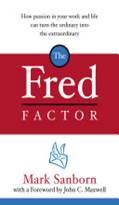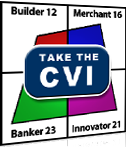Your “High-Potential” Checklist: Assess Yourself and See Where You Stand
By: Mary Werner, CPA, MOD, Big4 Guest Blogger
“I believe through learning and application of what you learn,
you can solve any problem,
overcome any obstacle and achieve any goal
that you can set for yourself.”
~Brian Tracy
High potential?
The words “high potential” spark debate in corporations and professional firms in the U.S. and across the globe. What does it mean to be a “high potential?” How do companies identify high-potential employees?
Research and results from varying organizations are inconclusive. And the criteria for naming a high potential employee varies between organizations. But that shouldn’t stop you from seeking out opportunities to learn the new skills, behaviors and attributes that will place you squarely on the road required for leadership at higher and higher levels.
The dictionary defines the word POTENTIAL as “capable of being or becoming” and “having possibility.”HIGH, of course is defined as “exceeding the common degree or measure.” So high-potential employees continually perform at high levels and most importantly have the capacity and attitude to take on more challenges. They are willing and eager to learn new skills in response to tough and changing circumstances. Do these attributes describe you?
It’s often said that technical competence and cognitive intelligence are only the baseline or entry point for the high potential. We’ve all seen smart, technical employees flame out on their way to the leadership ranks because they either cannot or are unwilling to learn and develop new skills. Research completed by Michael M. Lombardo and Robert W. Eichinger and published in an article titled, High Potentials as High Learners, identifies how important “learning agility” is to an employee’s high performance. (Human Resource Management, Winter 2000, Vol.39, No.4, pp 321-330) They also describe behaviors and attributes that separate high performers from the rest of their peers.
In June of 2010, Harvard Business Review published an article written by Douglas Ready, Jay Conger and Linda Hill titled, “Are You a High Potential?” in which the authors articulated many of the same attributes as were identified in 2000.
Based on that research, I’ve adapted the following self-assessment to help you focus on the behaviors and attributes that will place you further on the road to new and challenging leadership opportunities. Use it as your personal check-list to identify areas for growth and development.
Your “High-Potential” Self Assessment
- I know myself well and continually explore my own self-development.
- I actively seek out and want more new and challenging experiences to learn from.
- I ask for and welcome feedback to change my behavior and learn new viewpoints.
- I’m cool and resilient under pressures of change.
- I inspire others to perform beyond normal.
- I am comfortable with complexity and ambiguity.
- I am very curious and have a passion for learning new skills and ideas.
- I am not afraid to make mistakes and when I do, I learn from my experience.
- I am focused on getting results through others by building trust and credibility and maintaining effective personal relationships.
- I have an ability to see the big picture and operate in tune with my organization’s culture and values.
- I won’t sacrifice my personal integrity to get ahead.
- I’m proactive, ready and willing to make a decision and act on it.
- I’m not satisfied with the status quo.
We’re looking for “yes” answers to the above attributes and behaviors. And while many of us don’t have all these attributes nailed, high-potential employees possess many of them and in a balance that allows them to outshine their peers. So if you want to be considered a high-potential employee in your firm, ask yourself honestly if you display these characteristics.
The good news is that these skills can be learned. I have coached numerous high-potential CPA firm leaders who are looking to broaden their base of skills and further hone the skills they already possess. These attributes do not “stand alone,” but rather, are an integral part of your daily work experience.
Whether you engage a coach, seek out a mentor, or pursue new and more challenging work in your current firm or elsewhere, ultimately the choice to learn and grow is yours.















